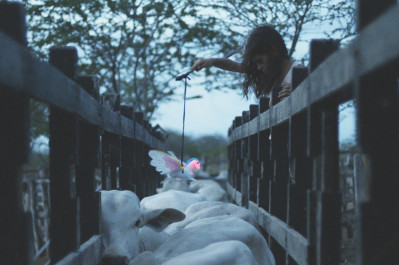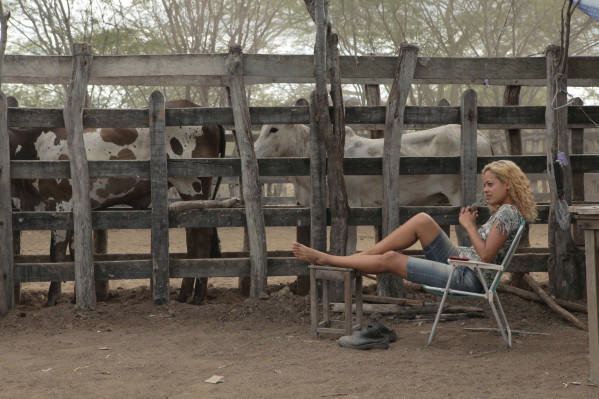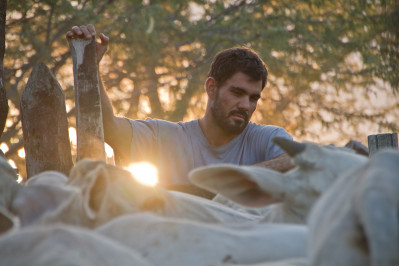INTERVIEW: Gabriel Mascaro expands image of cowboy culture in ‘Neon Bull’

Neon Bull, the new Brazilian film from director Gabriel Mascaro, follows the day-to-day life of Iremar (Juliano Cazarré), a rugged cowboy who hopes to one day become a fashion designer. The film, which opens Friday, April 8 at the Film Society of Lincoln Center in New York, is steeped in the world of the vaquejada, a tradition in northeast Brazil that finds cowboys pulling on the tails of bulls until they fall over.
The movie is a harsh, realistic portrait of the cowboy culture and those who make a living transporting these bulls from one event to another. Joining Iremar on the road trip is Galega (Maeve Jinkings), an exotic dancer and the truck driver; Cacá (Aline Santana), Galega’s curious, inquisitive daughter; and Zé (Carlos Pessoa), Iremar’s friend and colleague in the bullpen.
Bringing these stories to life, Mascaro focuses on reality, never shaping the narrative around a typical story arc or earth-shattering revelations. Instead, Neon Bull is a film that develops naturally, methodically, with scenes of family, passion, violence and sex blending into one portrait of wayward souls on the fringe.
“Actually I grew up in a city where I studied [with] lots of people from the countryside,” Mascaro said recently during a phone interview. “The weekend [we went to] the parties in the countryside to the vaquejada, rodeo. And so I grew up with [it] very close to me, but when I was older, of course, I had a different perspective and views about this.”

As an adult and as a filmmaker, Mascaro became interested in the transformation of the local community in connection to these rodeos. Everything from the society to the economy were affected in this “historically very poor” area of northeast Brazil. For his script, he also wanted to expand notions of common stereotypes and see how the rodeo affects personal relationships.
“So I tried to create characters that are expanding notions of the stereotypes we usually associate to the idea of cowboys, country culture,” he said. “And then I really met a real cowboy that works in the textile industry, so I became very curious and very happy.”

After meeting this man, Mascaro’s idea for the film changed. Originally, he was going to make a movie about the farmers in the region; however, he became sold on the idea of this would-be fashion designer. “I thought this could be a much more exciting and honest story to develop as a fictional treatment,” he said.
Even though the director captures some breathtakingly real performances, asking his actors to display life in all of its forms, this is not a documentary. Several audience members from the international screenings of Neon Bull believe that all of the actors, including the leads, are nonprofessional.
“Sometimes we show the film internationally, and people don’t know the actors,” he said. “[The] first question generally is how was it to work with nonprofessional actors, and actually the actors are very happy to listen, to hear that, because actually Iremar, Juliano Cazarré … is very famous. He’s a TV star in Brazilian TV.”
Other than the central cast, the rest of the movie features performances from real cowboys. “We had a big challenge to blend this — different people that comes from professional actors and real cowboys with real skills, and we put them three months together,” he said.
During this time, the professional actors learned how to take care of the bulls and work on a farm. The experience created real connections and real feelings between the two groups. “I [intended to do] something that we can believe in everything, and almost forget about the fiction and sometimes to think, oh, is this real,” he said. “There’s a very fine line, thin line where sometimes we forgot about if it’s fictional or real.”
Mascaro has a background in documentary film. His previous efforts include Housemaids and High-Rise. He also wrote and directed the film August Winds. “There’s a strong connection to my previous work, previous documentaries, the way I understand reality, but also since my first documentaries I start reflecting [on] how strong is the presence of fictionalization of our representation,” he said. “We are always representing realities, dealing with performance of ourselves. … It was a big challenge for me. It was the first time I worked with professional actors, and also … even more challenging for them because I came from documentary, so all my approach to fictional experience are very intense, very organic.”
This documentary-like style meant scenes without many cuts, and sometimes these single shots could last a long time. Compounding the challenges was the fact that Neon Bull uses large, real animals to tell the story. For many audience members, seeing these beautiful animals pulled down by the cowboys can be excruciating. “The animals in this film, they bring lots of magical moments and very realistic experience because we can’t control them,” Mascaro said.
The director said he believes that Neon Bull is a film about pleasure and violence, and how they inhabit the same bodies. So, sometimes the violence is apparent in the rodeo, and then there can be a scene where a handler will massage a horse as if it were a dog. Mascaro said this breaks the audience’s expectations. “It’s a film about the dualities of life that we have in ourselves,” he said.
He added: “When we think about rodeo culture, about vaquejada cowboy culture, we have a clear stereotype about that. We create lots of fantasies about who is who, about what is what.”
Mascaro’s mission was to expand on the stereotypes. “I’m really interested in relationships and small conflicts,” he said. “And so the film brings some very organic, and human and day-to-day experience.”
By John Soltes / Publisher / John@HollywoodSoapbox.com
- Neon Bull will play the Film Society of Lincoln Center in Manhattan, New York, starting Friday, April 8. Click here for more information. Gabriel Mascaro and actress Maeve Jinkings will accompany a couple of screenings on April 8. There will also be a retrospective of Mascaro’s other work, April 15-21.

